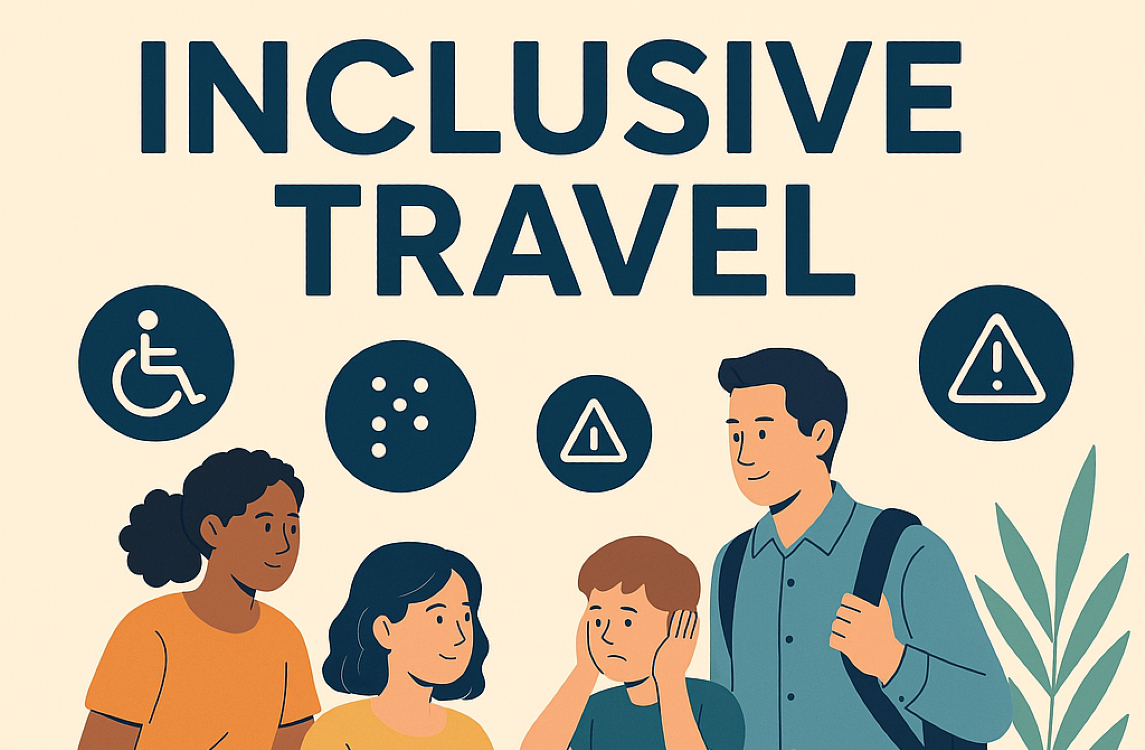Sensory-Friendly & Accessible Vacations Start Here

Wheelchairs, Sensory Spaces & More: How Resorts and Cruise Lines Are Getting Better at Accessibility
When you think of a dream vacation, you probably picture ease, relaxation, and fun for everyone. But for travelers with disabilities or sensory sensitivities, especially families with autistic children or adults with special needs, travel can often feel more stressful than serene. The good news? That’s starting to change in a big way.
As a Certified Autism Travel Professional and travel advisor who specializes in accessible and inclusive travel for families, couples, and groups, I’ve seen firsthand how resorts and cruise lines are stepping up to make vacations more welcoming for everyone.
Here are some of the most exciting ways the travel industry is becoming more inclusive—and how you can find the perfect fit for your unique needs.
1. Cruise Lines Are Creating Truly Inclusive Experiences
Cruising is a favorite among many of my clients because of its all-in-one convenience, but not all ships are created equal when it comes to accessibility. Thankfully, many cruise lines are now prioritizing:
-
Wheelchair-accessible cabins – These aren’t just about wider doors. They often include roll-in showers, lowered closet bars, wider turning radii, and bathroom grab bars. On some newer ships, even balcony cabins are designed to accommodate wheelchair users without sacrificing views or comfort.
-
Reserved seating in theaters and pool areas – This helps guests with mobility challenges enjoy entertainment without worrying about finding a suitable seat. Onboard staff are often available to assist with getting to and from venues and ensuring families can sit together.
-
Priority boarding and disembarkation – For travelers with sensory sensitivities, long lines and crowded terminals can be overwhelming. Many cruise lines allow guests with disabilities to board early or late (depending on their preference), so they can avoid peak chaos. Disembarkation assistance is also available for a smoother end to the journey.
-
Sensory-friendly spaces and quiet zones – Ships are starting to designate specific quiet times or areas for guests who may be overstimulated. These spaces are minimally lit, have lower noise levels, and are free from harsh smells or distractions. Some cruise lines even offer sensory kits with noise-canceling headphones, fidget toys, and weighted lap pads.
-
Trained staff – This is where my certification truly makes a difference. As a Certified Autism Travel Professional, I know how essential it is to have staff who understand the signs of sensory overload, know how to redirect with compassion, and recognize when a guest needs space or support. Cruise lines that invest in autism training give families peace of mind that they won’t have to explain everything from scratch.
Royal Caribbean, Carnival, and Disney Cruise Line all offer varying degrees of sensory-friendly and accessible programming. Disney, in particular, goes the extra mile with its thorough training and onboard accommodations for kids with autism.
2. Resorts Are Embracing the Needs of All Travelers
All-inclusive resorts are becoming more intentional about offering features and services that help all guests feel at home. Some standout offerings include:
-
Ground-floor or elevator-accessible rooms – Navigating stairs is a non-starter for many travelers, so resorts offering ground-floor or elevator-accessible rooms with wide doorways and open floor plans make a huge difference. These rooms often also have shower chairs, non-slip bathroom surfaces, and furniture placement that considers mobility needs.
-
Beach wheelchairs or ramps – Resorts located along the coast are realizing how important it is for all guests to experience the beach. Beach wheelchairs with wide, sand-friendly tires allow guests to access the water safely. Some properties even offer accessible boardwalks or ramps directly onto the beach.
-
Autism-certified staff – This is a game-changer. Resorts that work with organizations like IBCCES train their staff to understand autism spectrum disorders, how to communicate effectively, and how to respond to behavioral needs with empathy. These staff members can make children feel more welcome, provide alternatives when a meltdown is brewing, and help families feel like they’re not alone.
-
Customizable dining options – Dietary flexibility isn’t just about allergies anymore. Guests with autism may have strong preferences for certain foods or need special textures or presentation. Resorts that accommodate special requests ahead of time make mealtimes far less stressful. Look for resorts with buffet alternatives, gluten-free menus, or the ability to request simple dishes in advance.
-
Kids’ clubs with flexible participation – Inclusive kids’ clubs are offering smaller group sizes, quiet time rooms, sensory breaks, and visual schedules. Families are encouraged to join kids during initial visits to ease the transition. These changes make it possible for more kids to participate, play, and make friends in a way that feels safe.
Beaches Resorts, part of the Sandals family, is a great example. They’ve earned IBCCES certification and provide a level of attentiveness that many families with autistic children rave about.
3. It’s Not Just About Getting There—It’s About Feeling Welcome
The heart of accessibility isn’t just physical accommodations; it’s about inclusion. When a resort or cruise line invests in training, empathy, and thoughtful design, it tells guests, "You belong here."
And that’s exactly the kind of experience I want for my clients.
As someone who understands both the joys and challenges of traveling with special needs, I help take the guesswork out of planning by matching families and groups with travel partners who truly get it. Whether it’s arranging transportation that can accommodate a wheelchair or finding a resort with a sensory-friendly pool schedule, I’m here to make sure every detail works for you.
I work with suppliers and properties that value accessibility and who are open to collaboration, not just compliance. My goal is to empower families to travel with confidence, knowing their needs will be respected and anticipated.
Pro Tips for Accessible Travel Planning
-
Book early – Accessibility features are limited and in high demand. Booking early ensures you get the room, cruise cabin, or excursion options that best fit your needs.
-
Request accessibility features directly – Don’t assume a resort or cruise will know what you need. Let me advocate on your behalf so your requirements are clearly communicated in advance.
-
Ask about staff training – Autism-friendly doesn’t always mean certified. I help you find locations where staff training meets specific industry standards, like those from IBCCES.
-
Bring a letter or card – A written explanation of your or your child’s sensory or physical needs can help staff better assist you, especially if you encounter someone unfamiliar with invisible disabilities.
-
Work with a Certified Autism Travel Professional – This isn’t just a badge; it means I’ve completed specialized training to help families with autism and other sensory needs travel with ease. I know the right questions to ask, the red flags to avoid, and how to plan proactively for a smooth trip.
Let’s Plan a Vacation That Feels Like It Was Made for You
Everyone deserves a chance to travel in comfort, safety, and joy. If you or someone you love needs a little extra support when traveling, I’m here to help you navigate the options and find a getaway that fits just right.
Because the world is meant to be explored—and everyone deserves a front-row seat.
Reach out today and let’s build something unforgettable together.


